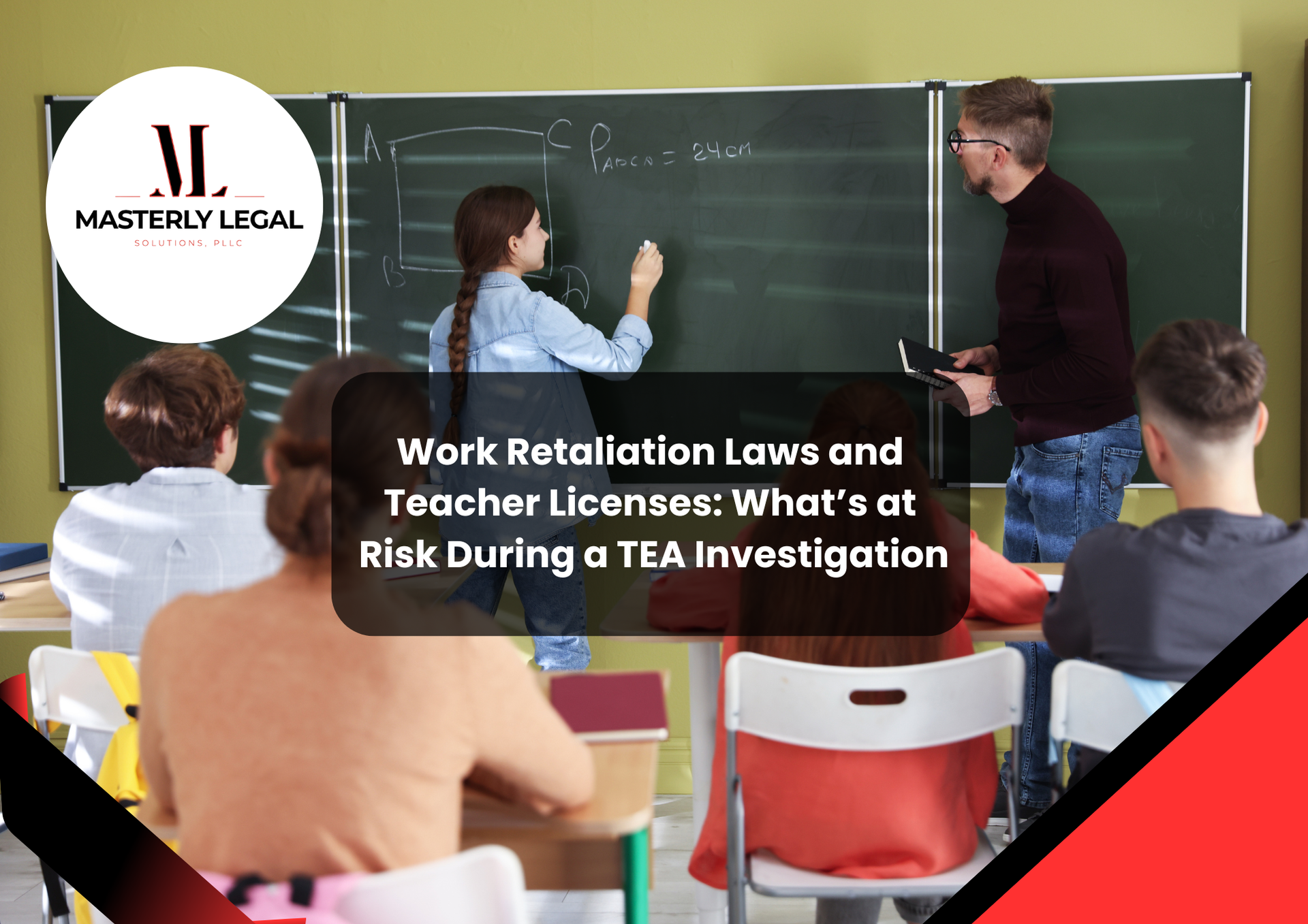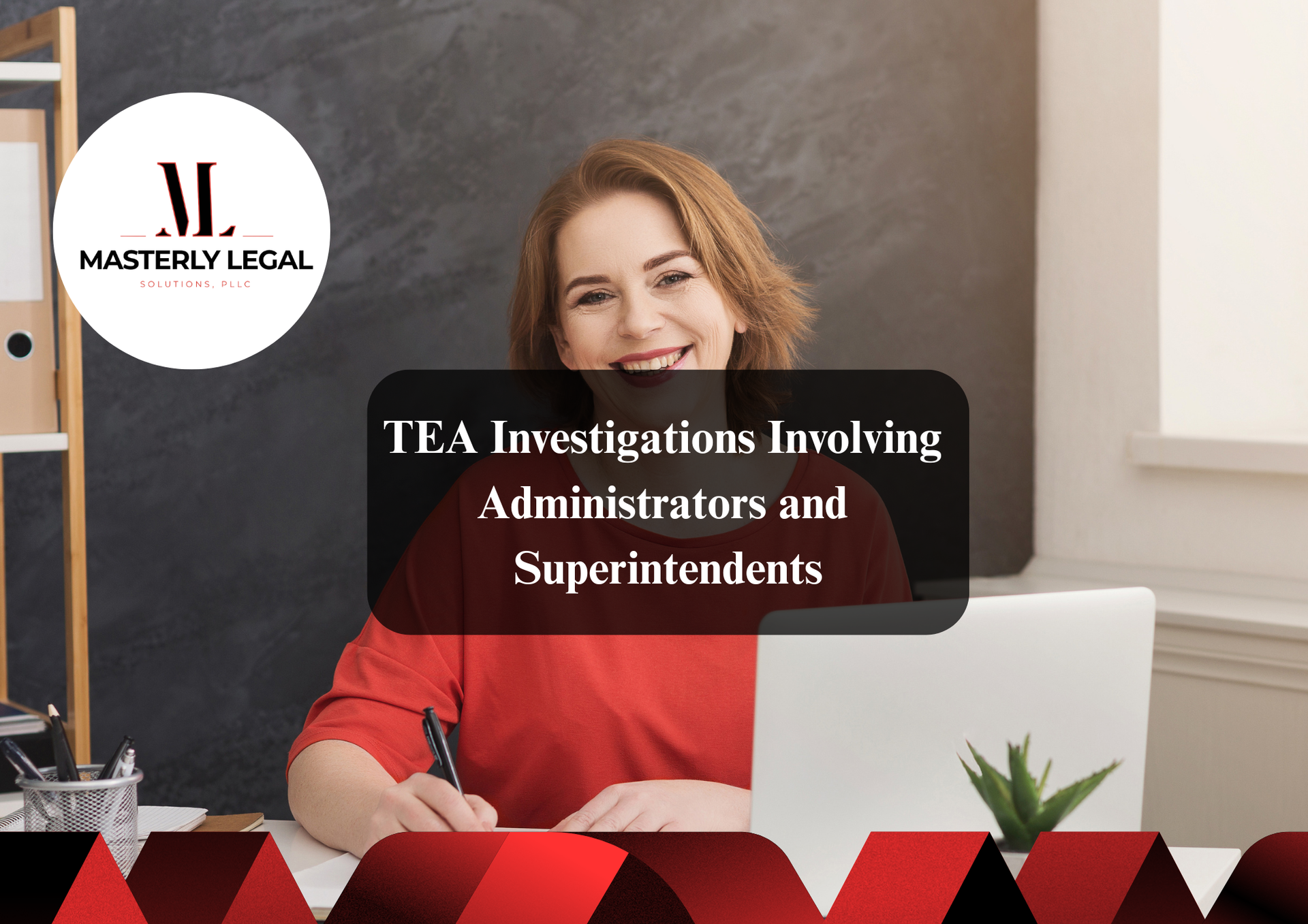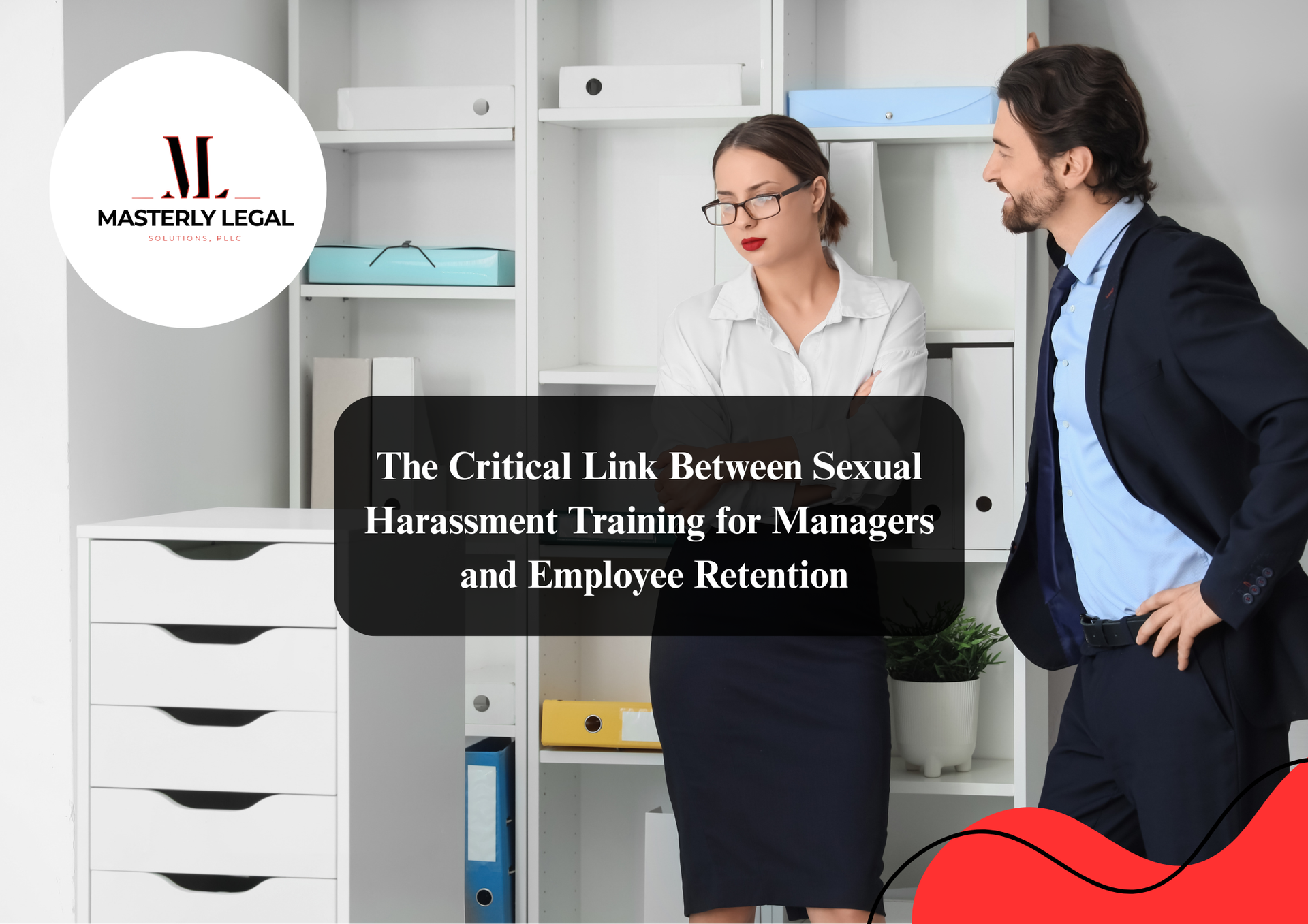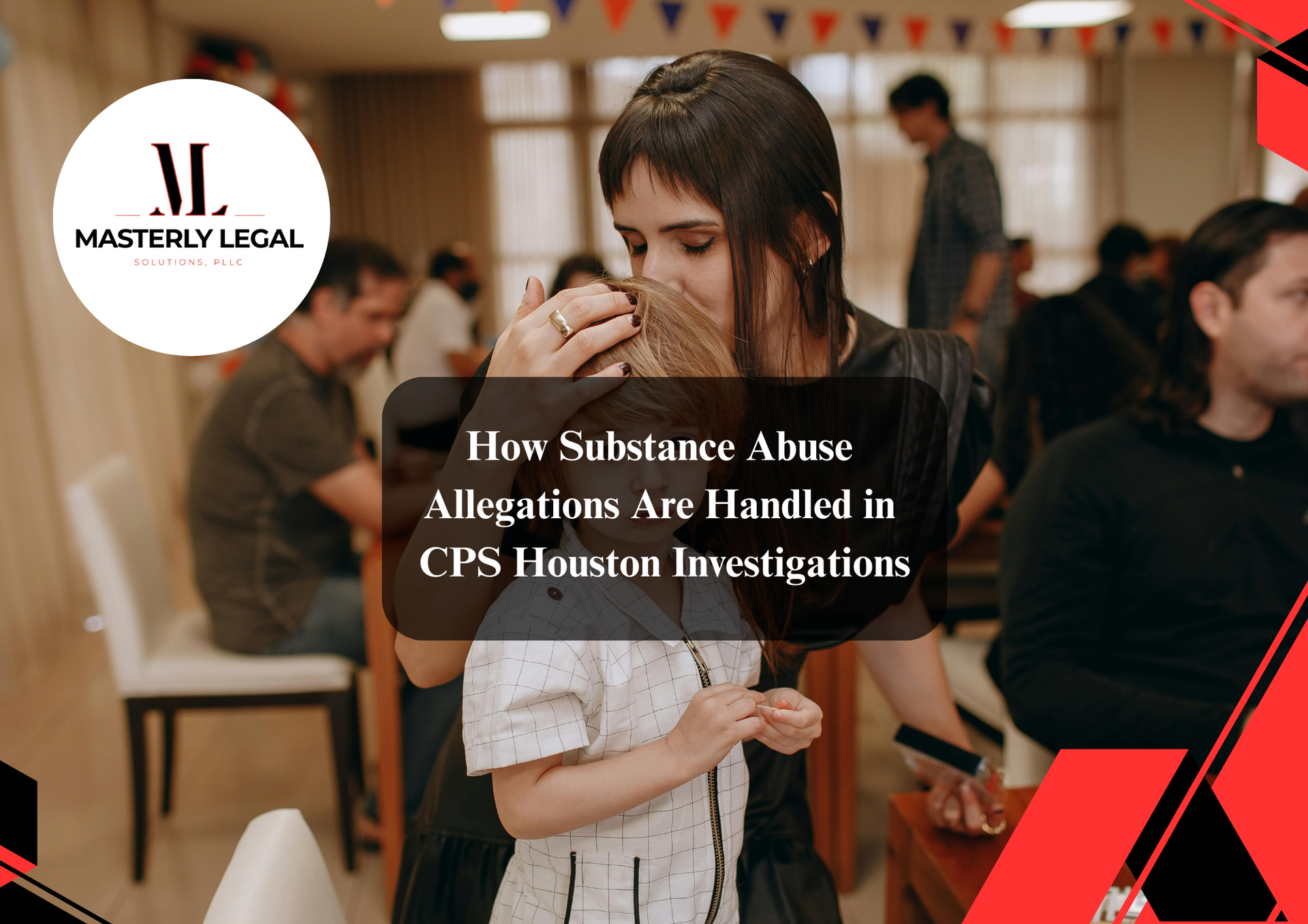Ignoring Corporate Misconduct Can Trigger Regulatory Action Here’s What to Do First
Recognizing the Warning Signs in the Workplace
Workplace misconduct rarely begins with a dramatic incident. Often, it starts with subtle behavior changes, policy violations, or rumors that go unchecked. Employers must understand the early signs of wrongdoing to avoid negative consequences. In many organizations, misconduct that seems minor at first can escalate and attract attention from government agencies.
Failing to investigate even minor allegations of wrongdoing may have negative consequences including regulatory audits, legal action, or reputational damage. Early detection and a structured workplace investigation can prevent more serious outcomes.
The Role of Internal Investigations in Protecting Your Business
Internal investigations are essential tools for uncovering and resolving wrongdoing in the workplace. These inquiries help employers maintain a healthy work environment, ensure adherence to company policies, and demonstrate a commitment to regulatory compliance. When left unchanged, problems involving misconduct can weaken company culture and open the door to greater liability.
Whether it involves theft of company property, conflicts of interest, or sexual misconduct, the internal investigation process provides a legal and strategic pathway to address these concerns before they spiral.
Common Forms of Corporate Misconduct That Require Action
Many organizations face challenges that demand immediate attention. These include:
- Fraud or misappropriation of funds
- Employee misconduct involving harassment or discrimination
- Theft of company property
- Insider threats or leaks of confidential information
- Allegations of retaliation or favoritism
All of these scenarios can result in a government investigation if left unaddressed. Promptly initiating a formal investigation helps employers gather evidence and apply corrective actions that may prevent litigation.
Understanding the Risks of Ignoring Allegations
Employers who ignore internal complaints risk more than just bad press. Government investigations may follow, particularly when the matter involves regulatory compliance, employment laws, or misuse of public funds. Regulatory action can lead to sanctions, operational restrictions, and reputational harm.
Moreover, ignoring allegations of wrongdoing sends a message to employees that misconduct is tolerated, which may result in:
- Decreased morale
- Loss of trust in leadership
- Employee resignations or whistleblower actions
- Increased liability and legal exposure
Steps to Take When Misconduct is Alleged
Taking immediate action is critical once allegations of misconduct surface. The following steps are central to an effective investigation process:
- Preserve all relevant documents and electronic communications, including emails and text messages.
- Identify the individuals involved and secure statements while memories are fresh.
- Conduct interviews with witnesses and parties involved to begin the fact-finding process.
- Develop an investigation plan outlining the scope, timeline, and objectives.
- Engage legal counsel or a third-party investigator to remain impartial and ensure legal protection.
Conducting a Legally Compliant Workplace Investigation
A legally sound workplace investigation is rooted in fairness, neutrality, and adherence to internal policies. This means the investigator must remain impartial, and all parties involved must be treated with respect and confidentiality. Investigation procedures should follow a consistent and documented process.
Hiring an external legal investigator or working with in-house counsel ensures that every aspect of the inquiry is compliant with applicable laws and internal policies. This reduces the risk of flawed findings or claims of bias.
Choosing the Right Investigator
The success of any corporate investigation often depends on the experience and credibility of the investigator. Whether using in-house resources or hiring outside counsel, the chosen investigator must:
- Be experienced in internal investigations
- Understand relevant employment laws
- Conduct effective interviews
- Protect sensitive information
- Avoid conflicts of interest
A skilled investigator not only improves the investigation findings but also provides a defensible process in case of legal scrutiny.
How to Handle Allegations of Sexual Misconduct
Allegations of sexual misconduct demand immediate attention and strict adherence to investigative protocols. Employers must ensure the safety and well-being of all parties involved, follow workplace policies, and document every step of the inquiry.
Failure to act quickly can expose the employer to liability and potential claims of negligence. The investigative process should be trauma-informed and compliant with relevant HR and legal standards.
Crafting a Comprehensive Investigation Plan
A structured investigation plan allows employers to navigate misconduct cases effectively. Elements of a successful plan include:
- Identifying all individuals involved
- Outlining objectives and key milestones
- Assigning roles for interviews and evidence collection
- Defining timelines for each stage
- Establishing methods for reviewing relevant information
Careful planning ensures consistency and reduces the risk of overlooking critical facts.
Conducting Interviews with Integrity
Interviews are a cornerstone of the internal investigation process. Investigators should prepare questions in advance, ensure a neutral setting, and avoid leading or accusatory language. Interviewees should be reminded of their rights and confidentiality protocols.
Common mistakes, such as failing to clarify statements or skipping follow-ups, can affect the reliability of investigation findings. Documentation of each interview should be thorough and secure.
Handling Evidence with Care
Evidence can include written records, emails, text messages, photographs, surveillance footage, and other digital or physical materials. Employers must gather evidence systematically and store it securely to prevent tampering or loss.
More evidence does not always mean better results. Instead, relevance and authenticity are key. Each piece of evidence should be evaluated against the allegations and cross-referenced with witness testimony.
The Importance of Documentation and the Investigation Report
Every step of the investigation process should be carefully documented. This includes:
- Interview transcripts or summaries
- Evidence logs
- Investigation plans and updates
- Interim findings
The final investigation report should be fact-based, clearly organized, and legally reviewed. It provides a permanent record of what was uncovered, who was involved, and what conclusions were drawn.
Determining Disciplinary Action and Corrective Actions
Once the investigation is complete, the employer must determine whether disciplinary action is warranted. This decision should align with company policies and be proportionate to the misconduct found.
Corrective actions may include:
- Termination or suspension of employees
- Mandatory training
- Changes to workplace policies
- Enhanced supervision or audits
- Remedial support for affected individuals
These steps not only resolve the issue but also show regulatory bodies that the employer acted responsibly.
Addressing Misconduct Involving Former Employees
In some cases, misconduct may be discovered after an employee has left the organization. While this limits disciplinary options, the employer can still take corrective actions, such as updating internal controls or cooperating with government agencies.
Documenting these actions and including them in the investigation report helps demonstrate a commitment to compliance.
Mitigating Future Risk Through Proactive Measures
To prevent future incidents, employers should:
- Review and update workplace policies
- Train managers on identifying and reporting misconduct
- Conduct regular audits and compliance checks
- Encourage a speak-up culture
Proactive risk management is a cost-effective strategy that saves time, reduces liability, and improves morale.
Government Investigations and the Need for Legal Preparedness
If corporate misconduct triggers government investigations, having a well-documented internal investigation strengthens the company’s defense. Legal counsel can guide employers in responding to subpoenas, managing public relations, and complying with regulatory demands.
Being prepared may significantly reduce penalties or prevent prosecution.
Working with Legal Counsel to Mitigate Risk
Legal counsel plays a critical role in every stage of the investigative process. Their involvement helps:
- Validate investigation procedures
- Ensure compliance with employment laws
- Protect privileged communications
- Advise on disciplinary actions
In-house counsel or external attorneys provide clarity and reduce the chance of errors that may have negative consequences.
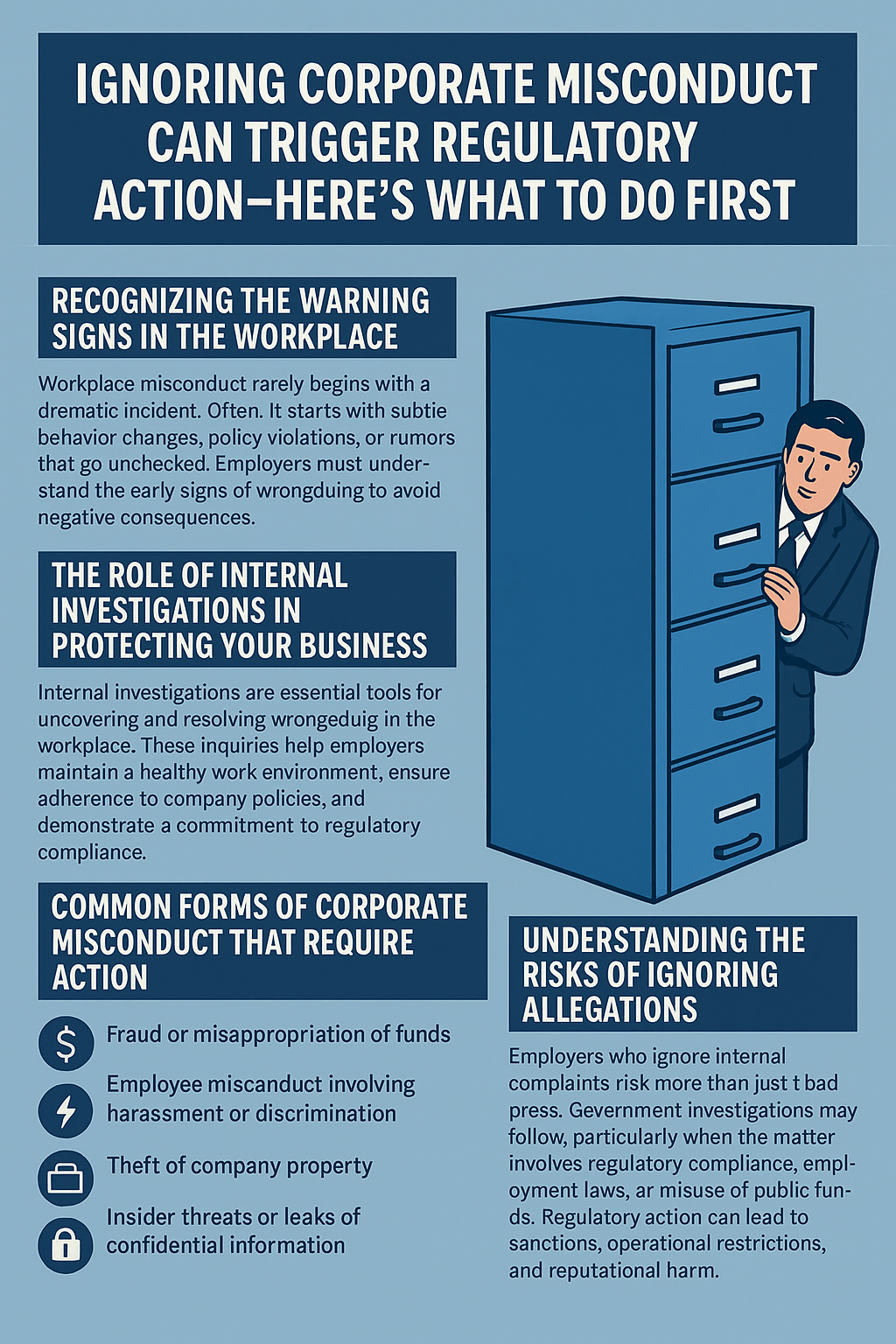
The Role of Internal Policies and Training
Internal policies set the foundation for ethical conduct and accountability. Employers should ensure that all employees understand these policies and know how to report wrongdoing.
Regular training sessions can reinforce expectations and reduce incidents of misconduct. Clear policies also provide a framework for the investigator to follow.
Involving Stakeholders and Executives in the Process
When allegations of wrongdoing affect high-level staff or multiple departments, executive involvement is essential. Transparent communication with stakeholders helps maintain trust and ensures alignment with company values.
Executives should be briefed on investigation findings, risks, and corrective measures.
Transparency and Credibility: The Keys to a Trustworthy Process
Credibility matters. The way a company handles internal investigations reflects its culture and priorities. Remaining impartial, respecting confidentiality, and documenting every step enhance the credibility of the process and protect the organization from scrutiny.
Stakeholders, employees, and regulators expect integrity and consistency.
Protecting Your Business Begins with Immediate Action
The decision to initiate an investigation should never be delayed. Allegations must be taken seriously, regardless of the role or status of the individuals involved in the misconduct. Employers should act promptly, stay compliant, and use the investigative process as a strategic tool to safeguard operations.
What to Expect During an Internal Investigation into Employee Misconduct
Employee investigations are a vital part of maintaining regulatory compliance and protecting your company from liability. What you can expect during an internal inquiry will vary depending on the nature of the allegations, the individuals involved, and the scope of the misconduct. Some investigations are straightforward,
involving a single employee and clear evidence, while others are complex, spanning departments and requiring multiple interviews. Regardless of complexity, all employee investigations must follow established procedures to ensure fairness and legal defensibility. Failing to plan appropriately or conduct a thorough process can leave your organization vulnerable to further scrutiny or enforcement action.
Preserving a Safe and Ethical Work Environment
An effective internal investigation does more than resolve specific allegations—it reinforces the values that shape a company’s work environment. Addressing misconduct swiftly demonstrates that unethical behavior will not be tolerated, which builds trust among employees and strengthens the organizational culture. A respectful, inclusive, and legally compliant work environment reduces turnover, enhances morale, and minimizes legal exposure. Employers who invest in proactive measures to protect their workplace are better positioned to handle challenges before they escalate. A stable work environment is not only a legal safeguard but a competitive advantage.
The Fact-Finding Phase: Building a Reliable Foundation for Action
The fact-finding stage of any internal investigation is critical to uncovering the truth behind allegations of wrongdoing. During this phase, investigators gather evidence, conduct interviews, and review relevant documents to establish a clear picture of events. Effective fact finding ensures that decisions about disciplinary action or corrective measures are based on verified information rather than assumptions. Skipping or rushing this stage can undermine the entire investigative process and open the door to legal challenges. A structured, impartial approach to fact finding helps maintain credibility and positions the organization to take defensible actions.
What to Expect During an Internal Investigation into Employee Misconduct
Employee investigations are a vital part of maintaining regulatory compliance and protecting your company from liability. What you can expect during an internal inquiry will vary depending on the nature of the allegations, the individuals involved, and the scope of the misconduct. Some investigations are straightforward, involving a single employee and clear evidence, while others are complex, spanning departments and requiring multiple interviews. Regardless of complexity, all employee investigations must follow established procedures to ensure fairness and legal defensibility. Failing to plan appropriately or conduct a thorough process can leave your organization vulnerable to further scrutiny or enforcement action.
The Value of an Internal Investigations Attorney in High-Stakes Cases
When allegations of serious misconduct arise, involving an internal investigations attorney can make the difference between a compliant resolution and a costly legal failure. These attorneys bring specialized expertise in employment law, regulatory compliance, and investigative procedures. They help ensure that the process is impartial, well-documented, and legally defensible—especially when multiple parties are involved or the stakes include potential government investigations. An internal investigations attorney also advises employers on next steps, from gathering evidence to taking corrective action, all while protecting privileged information. Their involvement signals a commitment to transparency, fairness, and legal integrity.
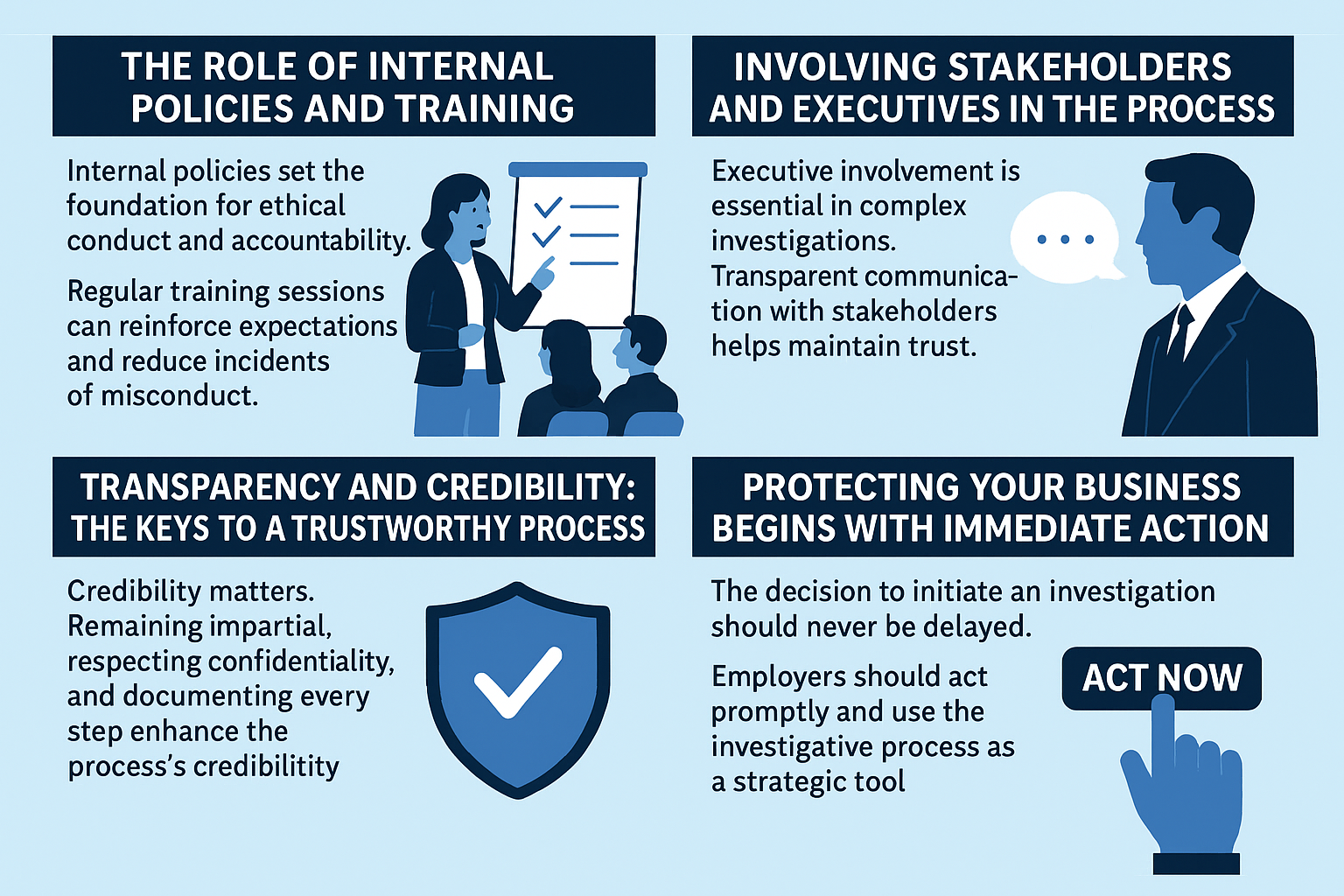
What Is an Internal Investigation?
An internal investigation is a structured, confidential inquiry conducted by a company to address allegations of misconduct, violations of company policies, or breaches of regulatory standards. The goal is to uncover facts, determine accountability, and implement appropriate corrective actions. Internal investigations can involve reviewing documents, interviewing employees, and assessing workplace procedures to ensure fair and lawful outcomes. Whether conducted by in-house counsel or external investigators, these inquiries are essential for preserving organizational integrity and avoiding legal exposure. A properly executed internal investigation protects both the company and its employees from the fallout of unresolved wrongdoing.
What Triggers an Investigation at Work and How to Respond
An investigation at work is typically initiated when allegations of employee misconduct, policy violations, or ethical breaches surface. Triggers can include anonymous complaints, reports from supervisors, irregularities in financial data, or observed behavior that raises concerns. Once an issue is flagged, employers have a legal and ethical responsibility to act swiftly and document each step. Conducting an impartial and well-structured investigation at work sends a clear message that integrity and accountability are top priorities. Ignoring early warning signs can lead to deeper problems that jeopardize employee trust and invite regulatory scrutiny.
Why Internal Investigation Services Are Essential for Employers
Internal investigation services provide businesses with a structured, legally sound method for handling allegations of workplace misconduct. Whether the issue involves fraud, harassment, or violations of company policies, these services ensure that the investigation process is impartial, thorough, and well-documented. Engaging professionals who specialize in internal investigation services helps safeguard the integrity of the inquiry while minimizing risks tied to bias or procedural errors. For employers facing complex or high-stakes situations, such as government investigations or employee litigation, having access to experienced investigative support is not just helpful—it’s critical.
Navigating the Work Investigation Process with Confidence
The work investigation process involves a series of deliberate, legally compliant steps designed to uncover facts and resolve allegations within the workplace. From the initial complaint to final resolution, employers must act swiftly, fairly, and consistently. This process typically includes developing an investigation plan, interviewing witnesses, reviewing documents, and documenting all findings. A well-managed work investigation process helps organizations maintain order, uphold internal policies, and avoid legal missteps. Employers who take this process seriously demonstrate their commitment to accountability and regulatory compliance.
Contact Masterly Legal Solutions Today
If you're facing workplace allegations or suspect internal wrongdoing, now is the time to act. Masterly Legal Solutions provides tailored legal support for corporate investigation matters. We help you navigate the internal investigation process with confidence, professionalism, and legal precision.
Our experienced team understands the high stakes. Whether it’s a matter of employee misconduct, fraud, or a compliance breach, we help you remain compliant, protect your brand, and move forward with strength.
Contact us at (972) 236-5051 for a free consultation. We'll help you determine your next steps and answer any questions about initiating a company internal investigation. The call could be the difference between containment and crisis.
This article is for informational purposes only and does not constitute legal advice. For personalized guidance, please consult with legal counsel.
Looking for Legal & Business Solutions? Contact Us Now
Fill in the form or call us to set up a meeting

